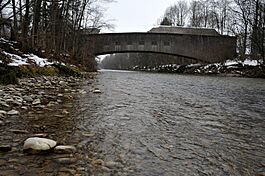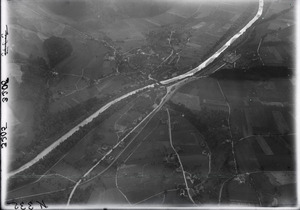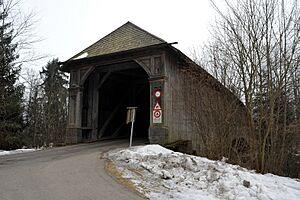Hasle bei Burgdorf facts for kids
Quick facts for kids
Hasle
|
||
|---|---|---|

Wooden bridge of Hasle-Rüegsau near Hasle
|
||
|
||
| Country | Switzerland | |
| Canton | Bern | |
| District | Emmental | |
| Area | ||
| • Total | 21.89 km2 (8.45 sq mi) | |
| Elevation | 571 m (1,873 ft) | |
| Highest elevation | 918 m (3,012 ft) | |
| Lowest elevation | 555 m (1,821 ft) | |
| Population
(Dec 2020 )
|
||
| • Total | 3,302 | |
| • Density | 150.85/km2 (390.69/sq mi) | |
| Postal code |
3415
|
|
| Surrounded by | Burgdorf, Heimiswil, Lützelflüh, Oberburg, Rüderswil, Rüegsau, Vechigen, Walkringen | |
Hasle bei Burgdorf is a small town, also called a municipality, in Switzerland. It is located in the Emmental district of the canton of Bern.
Contents
A Look at Hasle's History
Hasle bei Burgdorf has a long history! Some nearby settlements like Uetigen and Gomerkinden were first mentioned way back in 894. But Hasle itself was first written about in 1225 as Hasela. Over time, its name changed a bit to Hasle (1261), Hassly (1531), and Hassle (1574). The name Hasle comes from an old German word for "hazel bush."
Hasle in the Middle Ages
During the Middle Ages (a long time ago, from about 500 to 1500 AD), Hasle was part of an area controlled by a powerful family called the Kyburgs. Then, in 1384, the city of Bern took control. In 1525, Hasle became part of the Burgdorf area, which was like a local government office. Later, after a big change in government in 1798, Hasle became part of the Burgdorf district.
Exploring Hasle's Geography
Hasle bei Burgdorf covers an area of about 21.89 square kilometers (about 8.45 square miles). A large part of this land, almost 59%, is used for farming. About 32.5% is covered by forests. The rest of the land has buildings, roads, or rivers.
Rivers and Valleys
The town is located along the Emme river. It also sits in the Bigen and Biembach valleys. The land here ranges from about 570 to 900 meters (1,870 to 2,950 feet) above sea level. Hasle bei Burgdorf includes the main villages of Hasle, Goldbach, Schafhausen, and Biembach, plus smaller groups of houses called hamlets and farmhouses.
Hasle bei Burgdorf is about 5 kilometers (3 miles) southeast of Burgdorf, the main town of the district. It is in the Emmental region, which is known for its rolling hills and valleys. The Emme river forms the northeastern border of the town.
Hills and Forests
The southern and western parts of Hasle bei Burgdorf are covered by hills. These hills have many valleys and steep areas, which makes farming a bit tricky. Because of this, you'll see lots of pastures for animals and forests on these hills. The highest point in Hasle bei Burgdorf is on a hill called Wägesse, reaching 918 meters (3,012 feet) above sea level.
Hasle's Coat of Arms
The coat of arms for Hasle bei Burgdorf is quite special. It shows a cross made of four hazel leaves. The background is split down the middle, with one side black and the other white. The hazel leaves are "counterchanged," meaning they are white on the black side and black on the white side. This design is a "canting arms" because "Hasel" (hazel) sounds like "Hasle."
People of Hasle (Demographics)
Hasle bei Burgdorf has a population of 3,302. Most people in Hasle speak German, about 95.9%. Other languages spoken include Serbo-Croatian and Albanian.
Population Changes Over Time
The population of Hasle has changed over the years. Here's a look at how many people have lived there:

Cool Places to See (Attractions)
Hasle has some interesting historical spots.
Historic Buildings and Sites
The Protestant church in Hasle was built a long time ago, in the Middle Ages. It was rebuilt in a fancy Baroque style between 1678 and 1680. But some beautiful old paintings from the Late Gothic period were kept inside!
The wooden bridge of Hasle-Rüegsau is very important. It's listed as a Swiss heritage site of national significance. This means it's a really important historical and cultural landmark for the whole country! The villages of Goldbach and Bigel are also recognized for their historical importance.
Hasle's Economy (How People Work)
For a long time, Hasle bei Burgdorf was mostly a farming village. But over the years, it started to develop more trade and industry. In the 1800s, factories for hats, weaving, and even a brewery were started here.
Today, farming is still very important, especially dairy (milk production) and animal husbandry (raising animals). People also grow crops and fruit.
Jobs in Hasle
In 2008, there were 1,115 people working in Hasle.
- About 291 people worked in the primary sector, which means jobs like farming.
- Around 352 people worked in the secondary sector, which includes manufacturing (making things) and construction (building things).
- About 472 people worked in the tertiary sector, which covers services like sales, transportation, hotels, and healthcare.
Many people who live in Hasle travel to other towns for work. About 15% of workers use public transportation, and 53.1% use a private car to get to their jobs.
Religion in Hasle
In 2000, most people in Hasle belonged to the Swiss Reformed Church, about 81.8%. About 4% were Roman Catholic. There were also smaller numbers of people who belonged to other Christian churches, Islamic, Jewish, Buddhist, and Hindu faiths. Some people did not belong to any church.
Learning and Education
In Hasle bei Burgdorf, many people have completed higher education. About 41.2% of the population finished upper secondary education, and 8.8% went on to university or a specialized college.
School System in Bern
The school system in the Canton of Bern works like this:
- One year of non-required Kindergarten.
- Six years of Primary school.
- Three years of lower Secondary school, where students are grouped by their abilities.
- After secondary school, students can choose to continue their education or start an apprenticeship (learning a trade on the job).
In the 2009-2010 school year, 270 students attended schools in Hasle bei Burgdorf. There were 58 kindergarten students, 180 primary students, and 32 lower secondary students.
Getting Around (Transportation)
Hasle bei Burgdorf has two train stations: Hasle-Rüegsau and Schafhausen i.E.. The Hasle-Rüegsau station is important because it's where two different train lines meet. You can catch trains from here to places like Thun, Solothurn, and Langnau i.E..
See also
 In Spanish: Hasle bei Burgdorf para niños
In Spanish: Hasle bei Burgdorf para niños
 | Sharif Bey |
 | Hale Woodruff |
 | Richmond Barthé |
 | Purvis Young |






